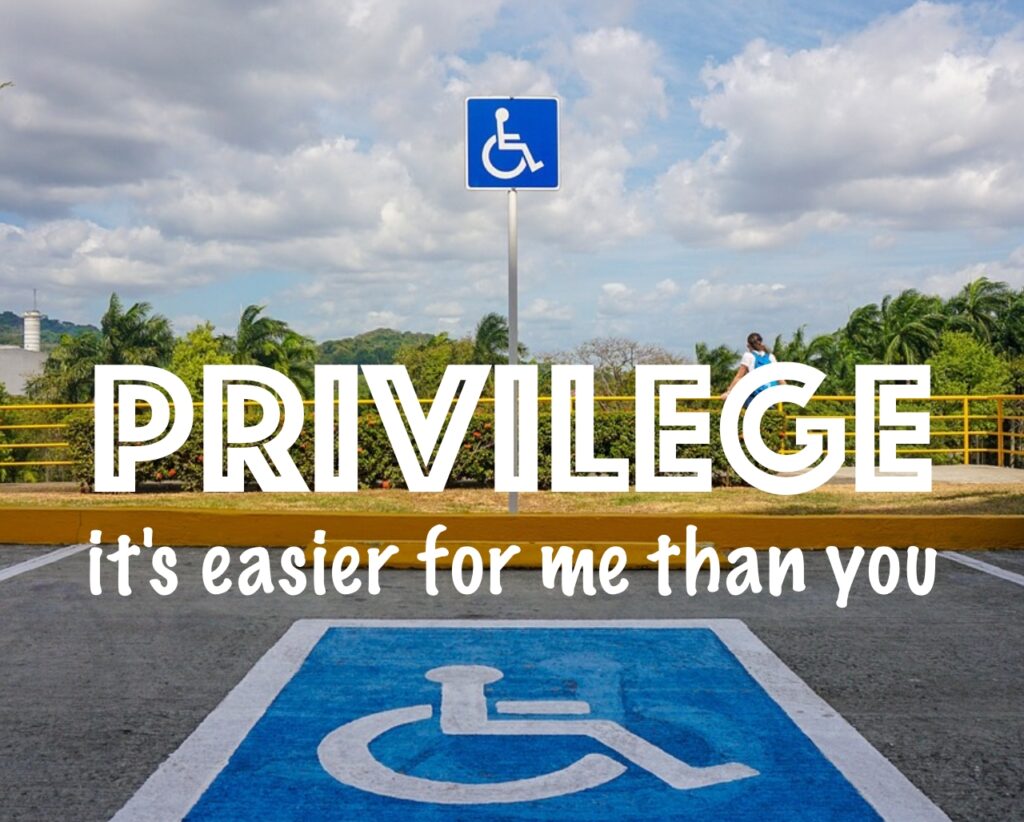Privilege – a special right, advantage, or immunity granted or available only to a particular person or group

What is privilege? What does it mean to be privileged or underprivileged, and how does privilege function in a society? Privilege is often related to power, cultural ideals, prejudice, structural violence, and history. When we talk about someone being privileged, we are talking about how certain qualities they have give them a step up in society, that they embody ideals that are considered valuable in a society, and therefore, aren’t punished or challenged for not having them, and do not face the same amount of inequalities and unequal opportunities in the same way as people who do not embody those traits.
Anthropologists study privilege as it relates to how people are in the world, and by identifying ways to address equity and equality. Although it varies by culture, worldwide people generally have or don’t have privilege based on race, ethnicity, sexuality, gender, class, citizenship status, socioeconomic status, age, and physical and neurological abilities. People with privilege will often act to maintain that privilege, by using a privileged position to maintain the power and status quo of the society, and therefore uphold their ease of access and lack of discrimination, which further reproduces the power and injustice of privilege in the first place.
||| Explore the Literature |||
Khan, Shamus. 2011. Privilege: The Making of an Adolescent Elite at St. Paul’s School. Princeton, NJ: Princeton University Press.
Summary by publisher. In Privilege, Shamus Khan returns to his alma mater to provide an inside look at an institution that has been the private realm of the elite for the past 150 years. He shows that St. Paul’s students continue to learn what they always have–how to embody privilege. Yet, while students once leveraged the trappings of upper-class entitlement, family connections, and high culture, current St. Paul’s students learn to succeed in a more diverse environment. To be the future leaders of a more democratic world, they must be at ease with everything from highbrow art to everyday life–from Beowulf to Jaws–and view hierarchies as ladders to scale. Through deft portrayals of the relationships among students, faculty, and staff, Khan shows how members of the new elite face the opening of society while still preserving the advantages that allow them to rule.
LeVon, Laura A. 2017. “Teaching Race: On Stereotypes and Privilege.” Teaching Tools, Fieldsights, April 17.
Summary: This article from the Society of Cultural Anthropology explores how teachers of anthropology can introduce, teach, and make an impact on students to understand their own privilege in the United States specifically. She outlines specific workshops and teaching tools she had found helpful in teaching the concept, and suggestions on how to work with students in the classroom.
https://culanth.org/fieldsights/teaching-race-on-stereotypes-and-privilege
Moses, Yolanda T. 2010. “Thinking Anthropologically About ‘Race’: Human Variation, Cultural Construction, and Dispelling Myths.” In Thinking Anthropologically: A Practical Guide for Students, 3rd edition, edited by Philip Salzman and Patricia Rice, 94−105. Upper Saddle River, N.J.: Prentice Hall.
Summary: In this introductory textbook, Moses explores core anthropological theories, history, and research methods. The elementary approach to anthropological thought is a useful tool for those who are new to anthropology to begin to think anthropologically and reflect on their own cultures and societies they may be a part of.
Waterston, Alisse. “The Habitus of Privilege and Position.” American Anthropological Association.
Summary: This article touches on the specifics of privilege as a term currently in the public eye and realm of academia from a specifically anthropological standpoint, and also reviews the most recent works on privilege from anthropologists.
https://www.americananthropologist.org/undergraduate-desire/habitus-of-privilege-and-position
Mukhopadhyay, Carol C. and Moses, Yolanda T. 1997. Reestablishing “Race” in Anthropological Discourse. American Anthropologist, 99: 517-533.
Abstract: Anthropology, despite its historic role in both creating and dismantling the American racial worldview, seems barely visible in contemporary scholarly and public discussions of “race.” The authors argue that race should once again be central to anthropological inquiry, that cultural and physical anthropologists must jointly develop and publicly disseminate a unified, uniquely anthropological perspective. They suggest ways to proceed and identify internal barriers that must be overcome before the anthropological voice can be heard.